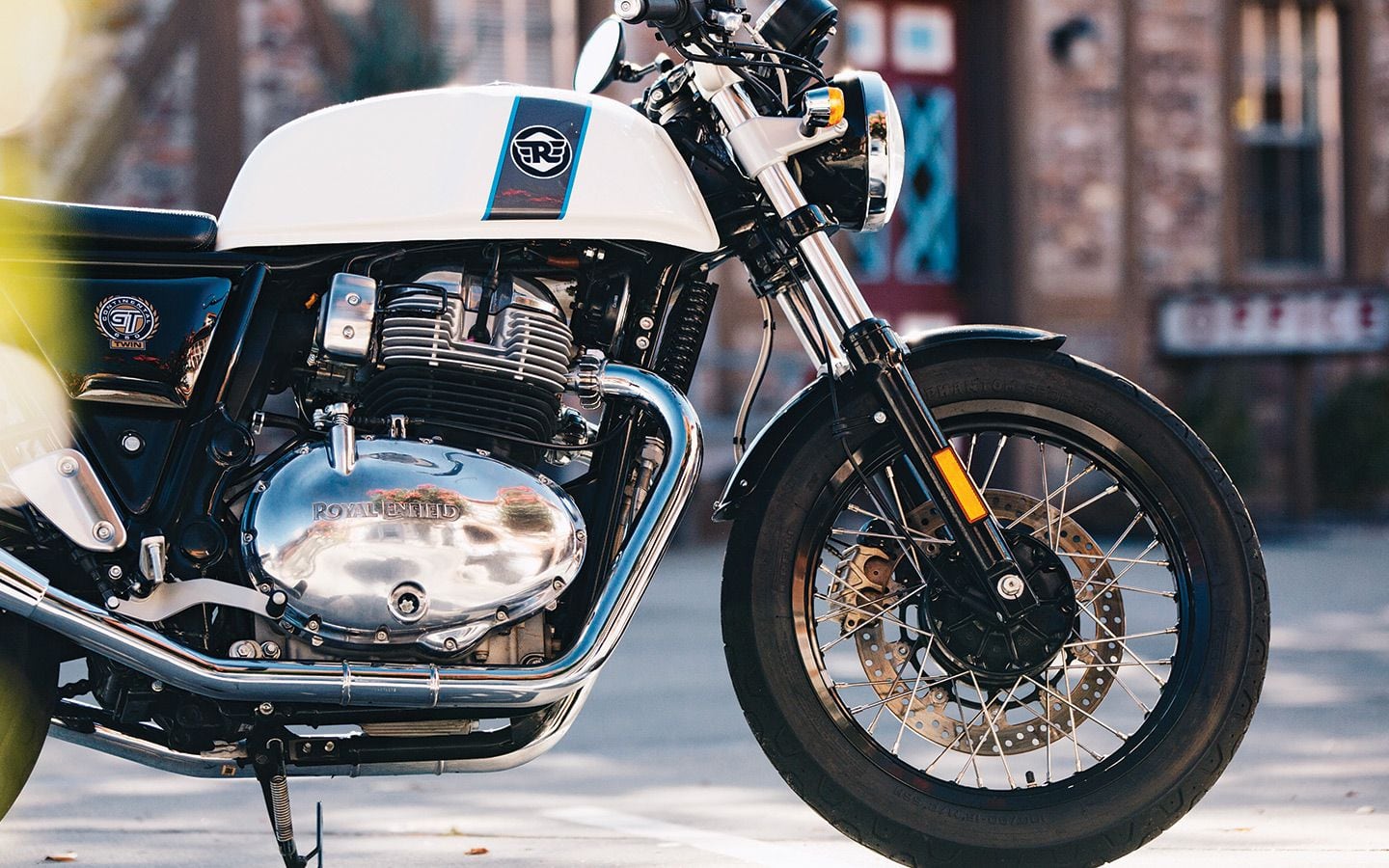Royal Enfield's INT650 and Continental GT are manufactured in India, engineered in England, and competing with a wave of high-quality machines from Thailand and China. Does globalization help or hinder these World Twins?
We sent a Japanese-American roadracer to a Danish enclave in California to find out.
Years ago, motorcycles were culturally homogenous. Every component in a Norton Manx could be relied upon to be designed and manufactured in the United Kingdom, just as all the bits that made up a Honda CB750 were Japanese, and the pieces that went into a Harley-Davidson UL were American. Those days are in the dust. The vagaries of regulation, international trade, and manufacturing have forced modern motorcycle makers to grow clever, hunting out components and designs from wherever they can be had. As a result, nearly every bike for sale today is a multinational affair.
Royal Enfield is no exception. The company’s two all-new twins, the INT650 and the Continental GT, are products of our brave new globalized world, conceived both to be logical stepping stones for Indian riders moving up from the company’s 350cc singles, and to give the manufacturer a foothold in other markets around the world, including the United States. They’re Enfield’s first real global products since the brand’s rebirth, and the motorcycles required international input.
Both use an all-new 648cc OHC air-/oil-cooled, eight-valve, parallel-twin engine. The crankshaft has a 270-degree firing order, similar to the Triumph Bonneville and Yamaha MT-07, and as with those bikes, it gives the engine a revvy character that shines whether playing in the canyon roads surrounding Solvang, California, or negotiating traffic through the center of town. The modest power figures of 44 hp and 38 pound-feet of torque on our dyno will disappoint spec-chart speculators, but the engine has plenty of power in practice. The valve train uses rocker arms with rollers on the cam side for less friction, and screw and locknut tappets on the valve side for easy maintenance. There’s even a slipper clutch to aid downshifts with the six-speed transmission.
Royal Enfield poached a former Suzuki engineer to lead development on the engine’s Mikuni throttle bodies. The result is silky-smooth fueling, with no hiccups to erode the confidence of novice hands.
That multinational influence continues with the double-downtube steel cradle frame. The chassis was developed in collaboration with noted British frame builder Harris Performance, which Royal Enfield purchased in 2015. Much of the initial research and development was conducted at the company’s testing facilities at the Bruntingthorpe Proving Ground in England, where most of the test personnel consisted of British and Australian racers.
Turn-in effort is light on both bikes, although perhaps a tad easier with the additional leverage provided by the taller conventional handlebar of the Interceptor. Steering manners are also light and neutral, allowing you to change lines midcorner easily while maintaining a lean angle without additional bar input. There’s more ground clearance available on the sportier-angled Continental GT, with its rearset pegs, but both bikes maintained their composure up to maximum pace.
The fork and shocks are made by U.S. automobile aftermarket manufacturer Gabriel, and the impressive overall handling of the 650 twins is also aided by 18-inch front and rear Pirelli Phantom Sportscomp tires. The Italian rubber is manufactured in Brazil at one of the company's many offshore facilities.
That Italian influence also carries over to the brakes. Some might have reservations about the single front disc brake setup on both bikes, but the front 320mm and rear 240mm discs are clamped by Bybre calipers—the vaunted Italian brake manufacturer Brembo’s Indian subsidiary. They do the job, even at an experienced rider’s pace.
The café racer Continental GT comes in at $5,999 for the base color model, $6,249 for multicolor schemes, and $6,749 for the chrome version, while the INT650 stickers even lower at $5,799 for the solid colors, $5,999 for the multicolor graphics, and $6,499 for the beautiful chrome version. Both twins come with a three-year, unlimited mileage warranty, plus roadside assistance designed to assuage any reliability concerns.
How much of a motorcycle hinges on where it hails from? What does the secret geography of its parts say about its character? History is littered with smart motorcycle brands cherry-picking the best engineering and design available. The truth is, the INT650 and Continental GT are good machines because of globalization, not in spite of it. Royal Enfield wisely turned to established developers for key components on both machines, and the finished products are well above what the brand could have accomplished alone. The result is a pair of inexpensive machines that are willing and eager to introduce a new generation to the joys of riding.











/cloudfront-us-east-1.images.arcpublishing.com/octane/22EMBGPDQIE5QFCOSEWBY7UGDI.jpg)
/cloudfront-us-east-1.images.arcpublishing.com/octane/MSCRRLTOLEGM24G4S2SX6OOBDY.jpg)
/cloudfront-us-east-1.images.arcpublishing.com/octane/435G2RCWP55YJ27KXEIGY4PBPI.jpg)
/cloudfront-us-east-1.images.arcpublishing.com/octane/6COBIPLOCH3Y4M2E72BCVERLJA.jpg)
/cloudfront-us-east-1.images.arcpublishing.com/octane/VZZXJQ6U3FESFPZCBVXKFSUG4A.jpg)
/cloudfront-us-east-1.images.arcpublishing.com/octane/QCZEPHQAMRHZPLHTDJBIJVWL3M.jpg)
/cloudfront-us-east-1.images.arcpublishing.com/octane/HXOUJXQWA5HBHGRO3EMJIGFMVI.jpg)

/cloudfront-us-east-1.images.arcpublishing.com/octane/3TIWWRV4JBBOLDVGRYECVVTA7Y.jpg)
/cloudfront-us-east-1.images.arcpublishing.com/octane/KIX5O23D5NAIBGFXBN3327DKZU.jpg)
/cloudfront-us-east-1.images.arcpublishing.com/octane/7GJYDUIPXRGMTMQKN6ONYOLBOU.jpg)
/cloudfront-us-east-1.images.arcpublishing.com/octane/MUQLOVLL2ZDGFH25ILABNBXKTI.jpg)
/cloudfront-us-east-1.images.arcpublishing.com/octane/TNOU5DNE2BC57MFPMGN2EIDXAM.jpg)
/cloudfront-us-east-1.images.arcpublishing.com/octane/GTCXACQGJ5HAPDTGWUQKDEH44E.jpg)
/cloudfront-us-east-1.images.arcpublishing.com/octane/S35YGSEMEZB4BLTDJTSZPF4GLA.jpg)
/cloudfront-us-east-1.images.arcpublishing.com/octane/5UOT6HPX2JFMRJAX6EH45AR4MQ.jpg)
/cloudfront-us-east-1.images.arcpublishing.com/octane/OKWOJWAKP5EP3OACCRRWPCIX2Q.jpg)
/cloudfront-us-east-1.images.arcpublishing.com/octane/2WF3SCE3NFBQXLDNJM7KMXA45E.jpg)
/cloudfront-us-east-1.images.arcpublishing.com/octane/G4MG6OUCJNBSHIS2MVVOTPX65E.jpg)
/cloudfront-us-east-1.images.arcpublishing.com/octane/IIGGWFOTOJGB7DB6DGBXCCMTDY.jpg)
/cloudfront-us-east-1.images.arcpublishing.com/octane/QSTCM6AVEZA5JJBUXNIQ3DSOF4.jpg)
/cloudfront-us-east-1.images.arcpublishing.com/octane/U4I7G625B5DMLF2DVIJDFZVV6M.jpg)
/cloudfront-us-east-1.images.arcpublishing.com/octane/B6XD6LS6IVCQPIU6HXDJSM3FHY.jpg)
/cloudfront-us-east-1.images.arcpublishing.com/octane/ICL63FEDDRDTTMINYICCEYGMDA.jpg)
/cloudfront-us-east-1.images.arcpublishing.com/octane/FCGZHQXRBZFLBAPC5SDIQLVF4I.jpg)
/cloudfront-us-east-1.images.arcpublishing.com/octane/WNOB6LDOIFFHJKPSVIWDYUGOPM.jpg)

/cloudfront-us-east-1.images.arcpublishing.com/octane/X33NU3E525ECRHXLNUJN2FTRKI.jpg)